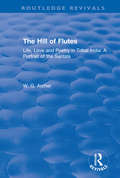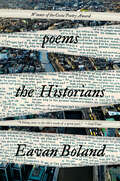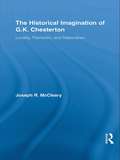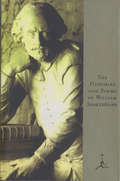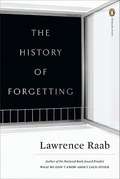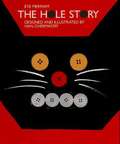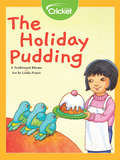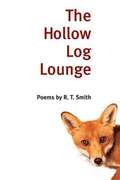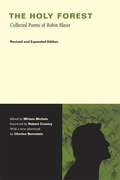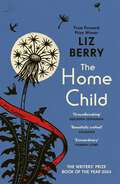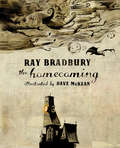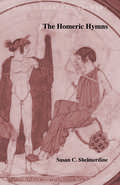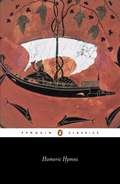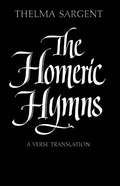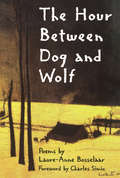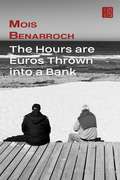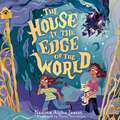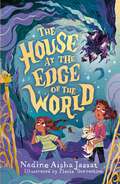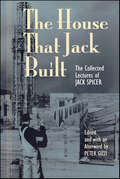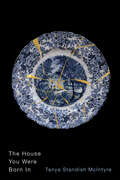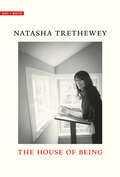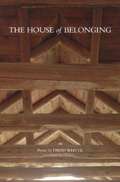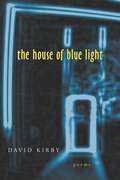- Table View
- List View
The Hill of Flutes: Life, Love and Poetry in Tribal India: A Portrait of the Santals (Routledge Revivals)
by W.G. ArcherOriginally published in 1974, The Hill of Flutes, is a descriptive account of the Santals and their poetry in their heartland of the Santal Parganas. The book explores the Santal world view, including approaches to education, love, sex, and marriage. It describes and discusses Santal dances, festivals and ceremonies, and other key events and gatherings, such as annual hunts. Through the close consideration of song and poetry, The Hills of Flutes offers an engaging insight into life in Santal society.
The Historians: Poems
by Eavan BolandA forceful and moving final volume from one of the most masterful poets of the twentieth century. Throughout her nearly sixty-year career, acclaimed poet Eavan Boland came to be known for her exquisite ability to weave myth, history, and the life of an ordinary woman into mesmerizing poetry. She was an essential voice in both feminist and Irish literature, praised for her "edgy precision, an uncanny sympathy and warmth, an unsettling sense of history" (J. D. McClatchy). Her final volume, The Historians, is the culmination of her signature themes, exploring the ways in which the hidden, sometimes all-but-erased stories of women’s lives can powerfully revise our sense of the past. Two women burning letters in a back garden. A poet who died too young. A mother’s parable to her daughter. Boland listens to women who have long had no agency in the way their stories were told; in the title poem, she writes: "Say the word history: I see / your mother, mine. / … / Their hands are full of words." Addressing Irish suffragettes in the final poem, Boland promises: "We will not leave you behind," a promise that animates each poem in this radiant collection. These extraordinary, intimate narratives cling to the future through memory, anger, and love in ways that rebuke the official record we call history.
The Historical Imagination of G.K. Chesterton: Locality, Patriotism, and Nationalism (Studies in Major Literary Authors)
by Joseph R. McClearyThis study examines a selection of Chesterton’s novels, poetry, and literary criticism and outlines the distinctive philosophy of history that emerges from these writings. Looking at Chesteron's relationship with and influence upon authors including William Cobbett, Sir Walter Scott, Belloc, Shaw, H.G. Wells, Christopher Dawson, Evelyn Waugh, and Marshall McLuhan, McCleary contends that Chesterton’s recurring use of the themes of locality, patriotism, and nationalism embodies a distinctive understanding of what gives history its coherence. The study concludes that Chesterton’s emphasis on locality is the hallmark of his historical philosophy in that it blends the concepts of free will, specificity, and creatureliness which he uses to make sense of history.
The Histories and Poems of Shakespeare
by William ShakespeareThis Modern Library edition presents all ten histories--each complete and unabridged--in the Shakespearean canon, along with notes and glossary. Here are: King John Richard II Henry IV, Part I Henry IV, Part II Henry V Henry VI, Part I Henry VI, Part II Henry VI, Part III Richard III Henry VIII Included also are the Bard's great narrative poems: Venus and Adonis and The Rape of Lucrece, the two works that first established Shakespeare's reputation, plus all 154 of his sonnets. Presented as well are A Lover's Complaint, The Passionate Pilgrim, and The Phoenix and the Turtle.
The History of Forgetting
by Lawrence RaabLawrence Raab's richest work to date-his saddest, funniest, most personal, and most searching book Of Lawrence Raab 's 1972 debut, Mark Strand wrote: "This is a first book with more authority and wisdom in it than most poets are able to manage in their entire careers. I am amazed by its casualness and clarity, its forcefulness, its engrossing strangeness. " Mystery and strangeness remain at the heart of Raab's work, but now they are revealed more fully through the world around us-everyday deceptions, inexplicable violence, unexpected tenderness, the comedy of hope and desire. In one poem, Proust appears in Raab's class to confront a student who disputes the great author's claim that "the true paradises are the lost paradises. " And in the title poem, set just before the Fall, the snake alone understands how people will come to yearn "for whatever they'd lost, and so to survive/ they'd need to forget. " .
The History of Forgetting
by Lawrence RaabLawrence Raab's richest work to date-his saddest, funniest, most personal, and most searching book Of Lawrence Raab 's 1972 debut, Mark Strand wrote: "This is a first book with more authority and wisdom in it than most poets are able to manage in their entire careers. I am amazed by its casualness and clarity, its forcefulness, its engrossing strangeness." Mystery and strangeness remain at the heart of Raab's work, but now they are revealed more fully through the world around us-everyday deceptions, inexplicable violence, unexpected tenderness, the comedy of hope and desire. In one poem, Proust appears in Raab's class to confront a student who disputes the great author's claim that "the true paradises are the lost paradises." And in the title poem, set just before the Fall, the snake alone understands how people will come to yearn "for whatever they'd lost, and so to survive/ they'd need to forget."
The Hole Story
by Eve MerriamDescribes all kinds of different holes, from straws to locks to noodles.
The Holiday Pudding: A Traditional Rhyme
by Cricket MediaChildren will love this traditional holiday poem with repeated words and rhymes about making Christmas pudding, a tasty holiday dessert. Add plums, flour, eggs, and spice and stir it all together!
The Hollow Log Lounge: POEMS
by R. T. Smith"This is no fairy tale. / It's all fantastic and bizarre and true. / It's my life, a raspy song, that sounds better if you sing along." The men and women who live and work near Opelika, Alabama, gather at the Hollow Log Lounge. There, under the watchful eye of the stuffed fox behind the bar, they unload their gripes and worries, tell their stories, argue, joke, commune, complain, and confess. In this collection of poems, R. T. Smith paints a vividly imagined portrait of the community in this small-town bar, capturing the chorus of the patrons' voices echoing off the knotted wood-paneled walls. Smith's stand-in, Sam Buckhannon, scribbles stories heard and overheard as tongues loosened by liquor spin out monologues in which southern idiom and vernacular seem perfectly at home within the constraints of measured verse.
The Holy Forest: Collected Poems of Robin Blaser (Revised and Expanded Edition)
by Robin Blaser Miriam NicholsThe Holy Forest, written over the course of five decades, is Robin Blaser's highly acclaimed lifelong serial poem. This edition includes numerous published volumes of verse, the ongoing "Image-Nation" and "Truth Is Laughter" series, and new work from 1994 to 2004.
The Home Child: from the Forward Prize-winning author of Black Country
by Liz Berry*WINNER OF THE WRITERS' PRIZE - BOOK OF THE YEAR*Inspired by a true story, The Home Child is a beautiful novel-in-verse about a child far from home‘Ground-breaking’ Benjamin Zephaniah‘Beautifully crafted’ Guardian‘Extraordinary’ Hannah LoweIn 1908, Eliza Showell, twelve years old and newly orphaned, boards a ship that will carry her from the slums of the Black Country to rural Nova Scotia. She will never return or see her family again.With nothing to call her own, the wild beauty of her surroundings is the only solace Eliza has – until another Home Child, a boy, arrives at the farm and changes everything.Inspired by the true story of Liz Berry’s great aunt, this spellbinding novel in verse is an exquisite portrait of a girl far from home.‘One of the outstanding books of this year. Although this is a historical tale its resonance is timeless’ Sunday Times‘Deeply moving. A graceful, delicate book, stunning in its emotional depth... I know I'll return to it many times in the future’ Megan Hunter, author of The End We Start From
The Homecoming
by Ray BradburyIllustrated classics for adults! Here, Collins Design's WISP series pairs two legendary creators–writer Ray Bradbury and artist Dave McKean–to create an irresistible package perfect for Halloween and all year 'round.The WISP series (Wonderfully Illustrated Short Pieces) represents an ingenious marriage of two creative forces: the artistry of today's foremost illustrators and the literary legacy of beloved authors of popular short works for adults. The resulting offspring of this union are captivating, full–color illustrated editions of timeless classics that readers will want to savor and collect.For the first time ever, the series makes selected popular short works previously offered only in collections available in a unique, stand–alone format. Also for the first time, WISPs harness the talents of top illustrators for the benefit and delight of a new, older audience.This WISP presents Ray Bradbury's The Homecoming, a little boy's tale of his family reunion of vampires. This story was initially published in 1946 and later refashioned into further stories. Bringing this story to life are the wondrous illustrations of Dave McKean, whose delightful artwork perfectly matches the tale.These one–of–a–kind, attractively priced and invitingly formatted illustrated editions will make a great impulse buy and appeal to a broad audience.
The Homeric Hymns
by Susan C. ShelmerdineThis is a collection of the standard texts of ancient Greek which are important components of what we know about Greek myth, religion, language and culture. All of the works collectively known as the Homeric Hymns are collected and translated here in their entirety, and the work includes ample notes and an introduction to provide information on the works' historic importance, a chronological table, genealogical chart, maps of Greece and the Aegean Islands, and illustrations of vase paintings with mythological themes. This edition is part of the Focus Classical Library.
The Homeric Hymns: A New Prose Translation, And Essays, Literary And Mythological
by HomerComposed for recitation at festivals, these 33 songs were written in honour of the gods and goddesses of the ancient Greek pantheon. They recount the key episodes in the lives of the gods, and dramatise the moments when they first appear before mortals. Together they offer the most vivid picture we have of the Greek view of the relationship between the divine and human worlds.
The Homeric Hymns: A Verse Translation
by Thelma SargentSpuriously attributed to Homer, the hymns and invocations collected in this book constitute, alongside The Iliad and The Odyssey the great sources of ancient Greek poetry. Now Thelma Sargent has rendered these works into a lucid and beautiful English verse. Accompanying the translated texts is a discussion of Greek meter and a explanation written by Sargent of her translation.
The Hour Between Dog and Wolf (New Poets of America)
by Laure-Anne BosselaarLaure-Anne Bosselaar's poetry captures the lives of "lost souls roaming"--be they young girls in convents, merchants, whores, widows, soldiers. Old Europe still lives in Bosselaar's rich language: Entre chien et loup, as it's known in Flanders--the time at dusk when a wolf can be mistaken for a dog.
The Hours are Euros Thrown into a Bank
by Mois BenarrochLast book of Benarroch in Spanish, with short poems and more short ones, some of them published directly in twitter in the last years. Mois Benarroch won the Amijai prize for poetry in 2012, and is one of the most translated poets of this decade worldwide.
The House At The Edge of The World
by Nadine Aisha JassatOn a cliff far away is a house at the edge of the world: Hope House. But it isn't like any other...When eleven-year-old Amal and her family inherit a house from a long lost relative, they can't believe their luck. But only Amal seems to notice there's anything unusual about it. Like the way the beds make themselves or the dishes never need cleaning, almost as if the house is taking care of them...But then a mysterious woman arrives claiming she is the house's true owner - and she gives Amal's family four weeks to leave before she demolishes it completely.The clock is ticking, and Amal is determined to save Hope House from destruction and stop her family from losing their new home. She needs to investigate who left them the house in the first place. Why did they choose Amal's family to protect it? And who is this woman threatening to tear it down?A mystery about family, identity and belonging. This story is perfect for fans of Matt Goodfellow, Onjali Q. Raúf or Disney's Encanto.
The House At The Edge of The World
by Nadine Aisha JassatHope House is more than just a building - it's a place of magic and mystery. . .When Amal and her family unexpectedly inherit the enchanted clifftop home, they can't believe their luck. But their joy is short-lived when a mysterious couple arrives, claiming the house is theirs and giving Amal's family just thirty days to pack up their stuff and leave before they demolish it completely.The clock is ticking, and Amal is determined to save Hope House from destruction. How will she unravel the secrets of the house and its mysterious benefactor in time to save it?A page-turning, lyrical mystery with a magical twist, perfect for fans of Matt Goodfellow, Onjali Q. Raúf and Disney's Encanto. Featuring accessible text in verse and beautiful illustrations throughout.
The House That Jack Built: The Collected Lectures of Jack Spicer
by Jack SpicerThe House That Jack Built collects for the first time the four historic talks given by controversial poet Jack Spicer just before his early death in 1965. These lively and provocative lectures function as a gloss to Spicer's own poetry, a general discourse on poetics, and a cautionary handbook for young poets. This long-awaited document of Spicer's unorthodox poetic vision, what Robin Blaser has called "the practice of outside," is an authoritative edition of an underground classic.Peter Gizzi's afterword elucidates some of the fundamental issues of Spicer's poetry and lectures, including the concept of poetic dictation, which Spicer renovates with vocabularies of popular culture: radio, Martians, and baseball; his use of the California landscape as a backdrop for his poems; and his visual imagination in relation to the aesthetics of west-coast funk assemblage. This book delivers a firsthand account of the contrary and turbulent poetics that define Spicer's ongoing contribution to an international avant-garde.
The House You Were Born In (Hugh MacLennan Poetry Series)
by Tanya Standish McIntyrea keeper of things forgotten, a vase / for pictures made by words, a riverbed / for the stories you tell, an earthen silhouette / of a childWith vivid imagery and endless compassion for her subjects, Tanya Standish McIntyre’s words breathe life. Her richly lyrical phrases capture both the fear and the beauty of growing up in a rural working-class community, anchored by the magical bond between a young girl and her grandfather. Way’s Mills, Quebec, is the setting for these poems, although as with Mark Twain’s Mississippi, physical place becomes a place in the heart in this elegy for lost ancestral farms. Standish McIntyre gives voice to the unspoken, shining a light into the dark corners of our collective memory to reveal an indelible past that gleams with clarity, empathy, and humanity. Taking seed in the dilapidated barns and warm sunlit rooms of Standish McIntyre’s personal history, these poems weave a filigree of well-worn remembrances and time-honoured treaties of the self, half forgotten yet ever lingering. Lucid, sharp, and crisp as spring water, this collection holds a sweeping narrative power that will stay with you long after the last line.
The House of Being (Why I Write)
by Natasha TretheweyAn exquisite meditation on the geographies we inherit and the metaphors we inhabit, from Pulitzer Prize winner and nineteenth U.S. poet laureate Natasha Trethewey “Searching and intimate, this impresses.”—Publishers Weekly In a shotgun house in Gulfport, Mississippi, at the crossroads of Highway 49, the legendary highway of the Blues, and Jefferson Street, Natasha Trethewey learned to read and write. Before the land was a crossroads, however, it was a pasture: a farming settlement where, after the Civil War, a group of formerly enslaved women, men, and children made a new home. In this intimate and searching meditation, Trethewey revisits the geography of her childhood to trace the origins of her writing life, born of the need to create new metaphors to inhabit “so that my story would not be determined for me.” She recalls the markers of history and culture that dotted the horizons of her youth: the Confederate flags proudly flown throughout Mississippi; her gradual understanding of her own identity as the child of a Black mother and a white father; and her grandmother’s collages lining the hallway, offering glimpses of the world as it could be. With the clarity of a prophet and the grace of a poet, Trethewey offers up a vision of writing as reclamation: of our own lives and the stories of the vanished, forgotten, and erased.
